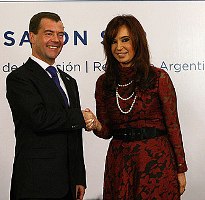Russia and Argentina have signed their third nuclear energy cooperation agreement in 18 months, covering the possible construction of Russian-designed nuclear reactors and the development of fuel cycle facilities in Argentina.
 |
| The Russian and Argentinian Presidents meet (Image: kremlin.ru) |
Rosatom head Sergei Kiryenko signed the agreement with Argentina's federal planning minister Julio de Vido during an official visit by Russian president Dmitry Medvedev to Argentina. The agreement follows on from a memorandum of understanding on the peaceful uses of atomic energy signed by Rosatom and Argentina's Ministry of Federal Planning, Investment and Service in February, and a joint statement signed in December 2008. The two countries signed a nuclear cooperation agreement in 1990.
According to Rosatom, the latest agreement expresses its willingness to act as a partner in designing and building nuclear power plants in Argentina based on Russian VVER pressurized water reactors, plus fuel supplies. For its part, the Argentinian ministry undertakes to consider the possibility of establishing various fuel cycle elements in the country, including development of domestic capacity for nuclear fuel fabrication.
In the wake of the meeting, Medvedev told reporters that Rosatom's entry into the Argentinian market would attract "billions" in investments in reactor building and infrastructure.
Argentina has two operating pressurised heavy water reactors (PHWR), Atucha 1 and Embalse. Construction work was suspended on the 81%-complete Atucha 2, a German-designed PHWR like Atucha 1, in 1994, but was resumed in 2006, and the unit is scheduled for operation in 2011.
However, Russia is not the only country that Argentina is talking to about a possible fourth nuclear unit. De Vido has been holding discussions with companies and officials from countries including Canada, South Korea, and France as well as Russia, and only days before he signed the agreement with Rosatom, held meetings in Washington with Westinghouse executives to discuss the possible construction of a third unit at Atucha. In the wake of that meeting, de Vido's ministry website reported that significant progress had been made towards cooperation with Westinghouse, and that Westinghouse representatives would visit Argentina in June to continue outlining possible collaborations.
Argentina has some fuel cycle facilities of its own, including a small domestic uranium mining industry, capable of milling up to 150 t/year, a 60 t/year conversion plant and fuel fabrication facilities able to produce fuel for both of the Argentinian reactor types. The country aims to make nuclear power part of an expansion of generating capacity to meet rising demand, and in late 2009 announced plans to build a prototype of its own CAREM simplified pressurised water design in the north-west of the country.
Researched and written
by World Nuclear News





_55401.png)
_23009.jpg)







